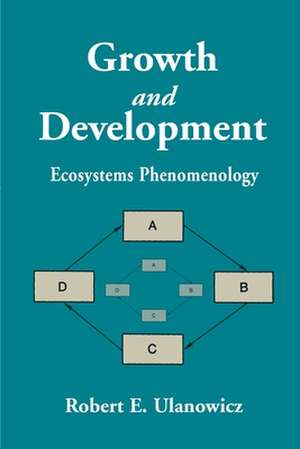Growth and Development
Autor Robert E. Ulanowiczen Limba Engleză Paperback
| Toate formatele și edițiile | Preț | Express |
|---|---|---|
| Paperback (2) | 95.45 lei 3-5 săpt. | |
| iUniverse – | 95.45 lei 3-5 săpt. | |
| Springer – 9 oct 2011 | 636.63 lei 6-8 săpt. |
Preț: 95.45 lei
Nou
Puncte Express: 143
Preț estimativ în valută:
18.27€ • 19.00$ • 15.08£
18.27€ • 19.00$ • 15.08£
Carte disponibilă
Livrare economică 25 martie-08 aprilie
Preluare comenzi: 021 569.72.76
Specificații
ISBN-13: 9780595001453
ISBN-10: 0595001459
Pagini: 224
Dimensiuni: 160 x 229 x 14 mm
Greutate: 0.33 kg
Editura: iUniverse
ISBN-10: 0595001459
Pagini: 224
Dimensiuni: 160 x 229 x 14 mm
Greutate: 0.33 kg
Editura: iUniverse
Cuprins
1. Introduction.- 1.1 The Enigma.- 1.2 The Imprecise Universe.- 1.3 The Dilemma of Modern Biology.- 1.4 Phenomenological Redress.- 1.5 Origins of the Principle.- 2. The Perspective.- 2.1 Thermodynamics: The Phenomenological Science.- 2.2 The First Law and the Nature of Work.- 2.3 The Second Law.- 2.4 Nonequilibrium Thermodynamics and Proto-Communities.- 2.5 Summary.- 3. The Object.- 3.1 The Ubiquity of Flows.- 3.2 Describing Flow Networks.- 3.3 Analyzing Flow Networks.- 3.4 Standing Stocks and Fluxes.- 3.5 Summary.- 4. An Agent.- 4.1 Cycles and Autonomous Behavior.- 4.2 Autonomous Behavior and Holistic Description.- 4.3 The Amount of Cycling in Flow Networks.- 4.4 The Structure of Network Cycles.- 4.5 Summary.- 5. The Calculus.- 5.1 Information Theory and Ecology.- 5.2 The Uncertainty of an Outcome.- 5.3 Information.- 5.4 Summary.- 6 The Description.- 6.1 The Network Perspective.- 6.2 Growth.- 6.3 Development.- 6.4 Simultaneous Growth and Development.- 6.5 Ascendency Arising from a Dynamic Tension.- 6.6 Generic Limits to Growth and Development.- 6.7 Autonomous Growth and Development Ill.- 6.8 The Limits to Autonomous Growth and Development.- 6.9 Phenomenological Basis for Optimal Ascendency.- 6.10 The Principle of Maximal Work.- 6.11 Relationship to Other Variational Principles.- 6.12 Summary.- 7 Extensions.- 7.1 The Incomplete Picture.- 7.2 Spatial Heterogeneity.- 7.3 Temporal Dynamics.- 7.4 Multiple Media.- 7.5 Overall Heterogeneity.- 7.6 Aggregation.- 7.7 Ascertaining Configurations of Optimal Ascendency.- 7.8 Other Applications—Economics and Ontogeny.- 7.9 Summary.- 7.10 Epilogue.- Appendix A: Review of Matrix and Vector Operations.- Appendix B: A Program to Calculate Information Indices.- References.- Author Index.
